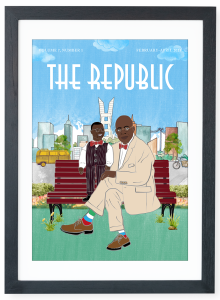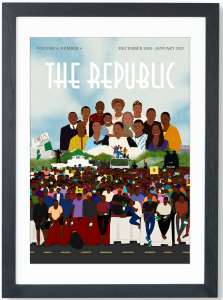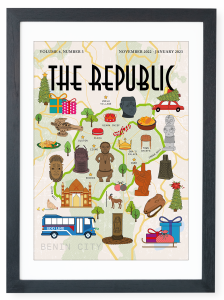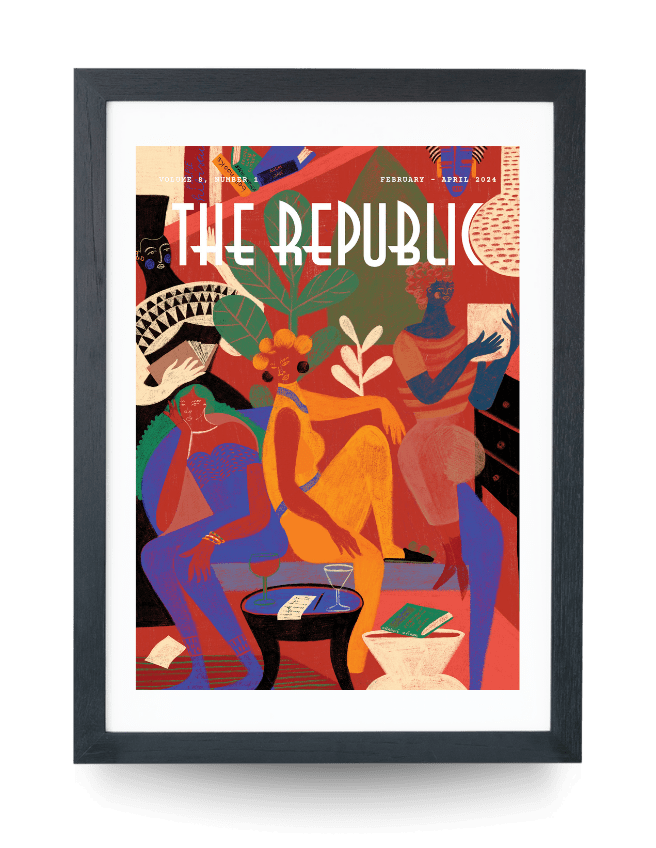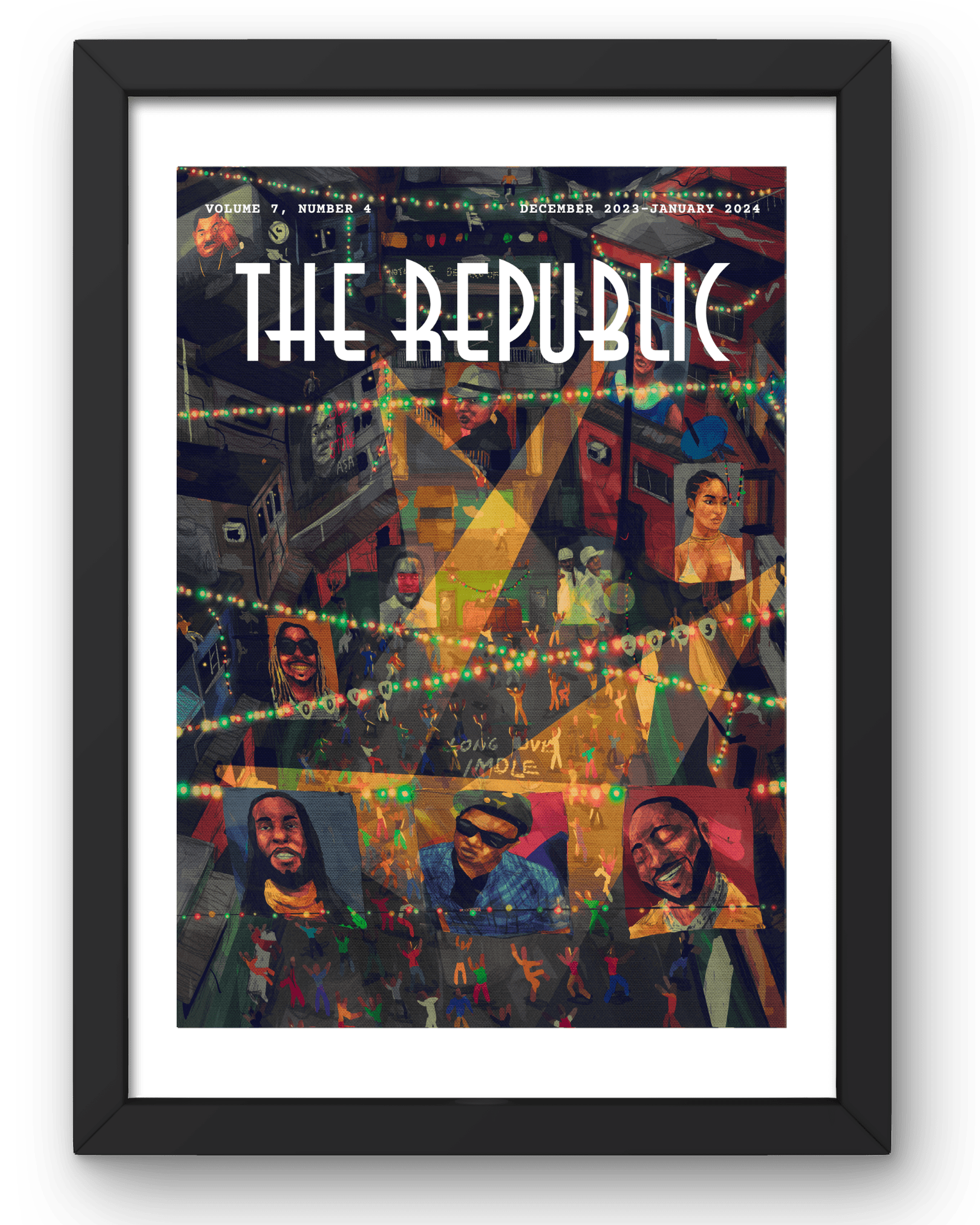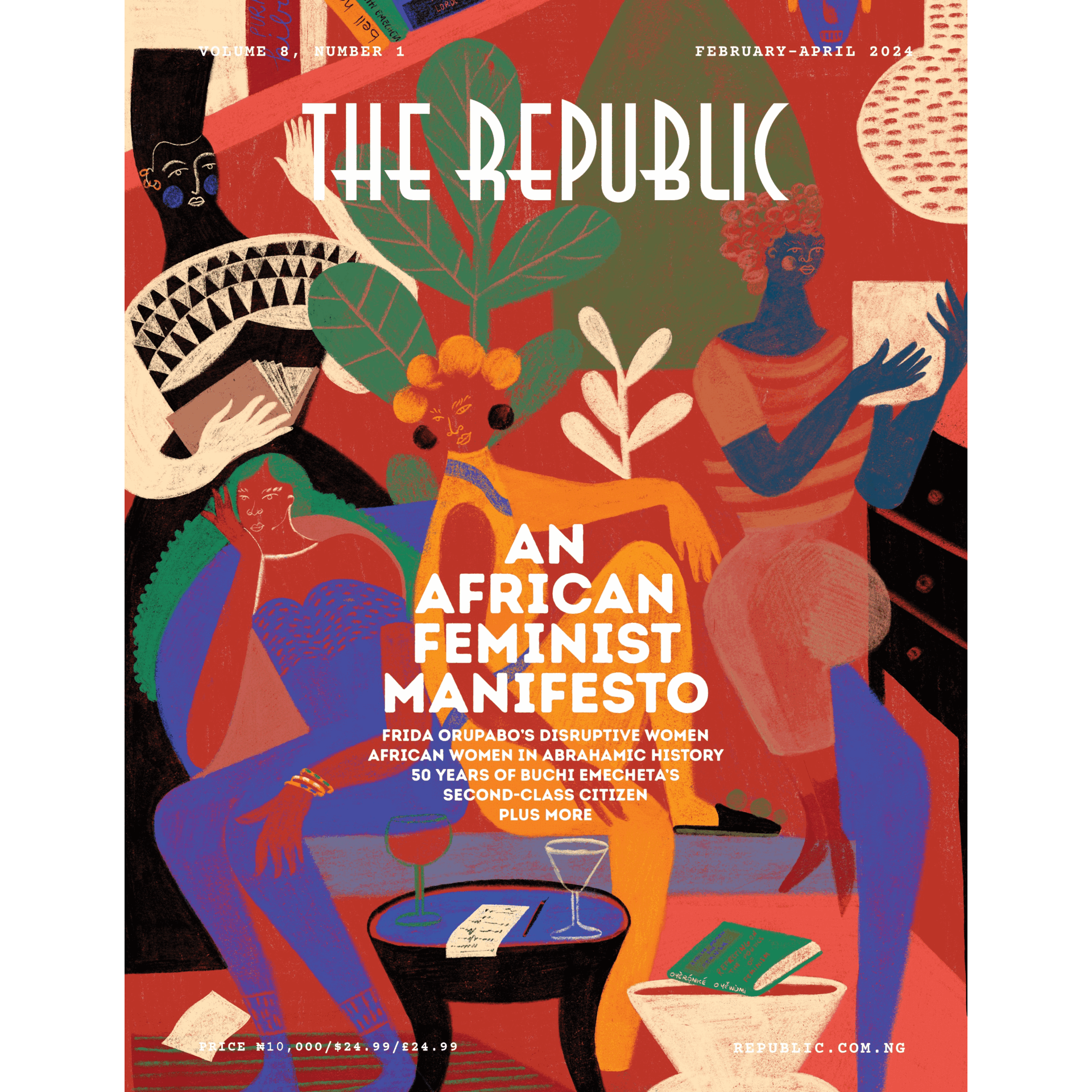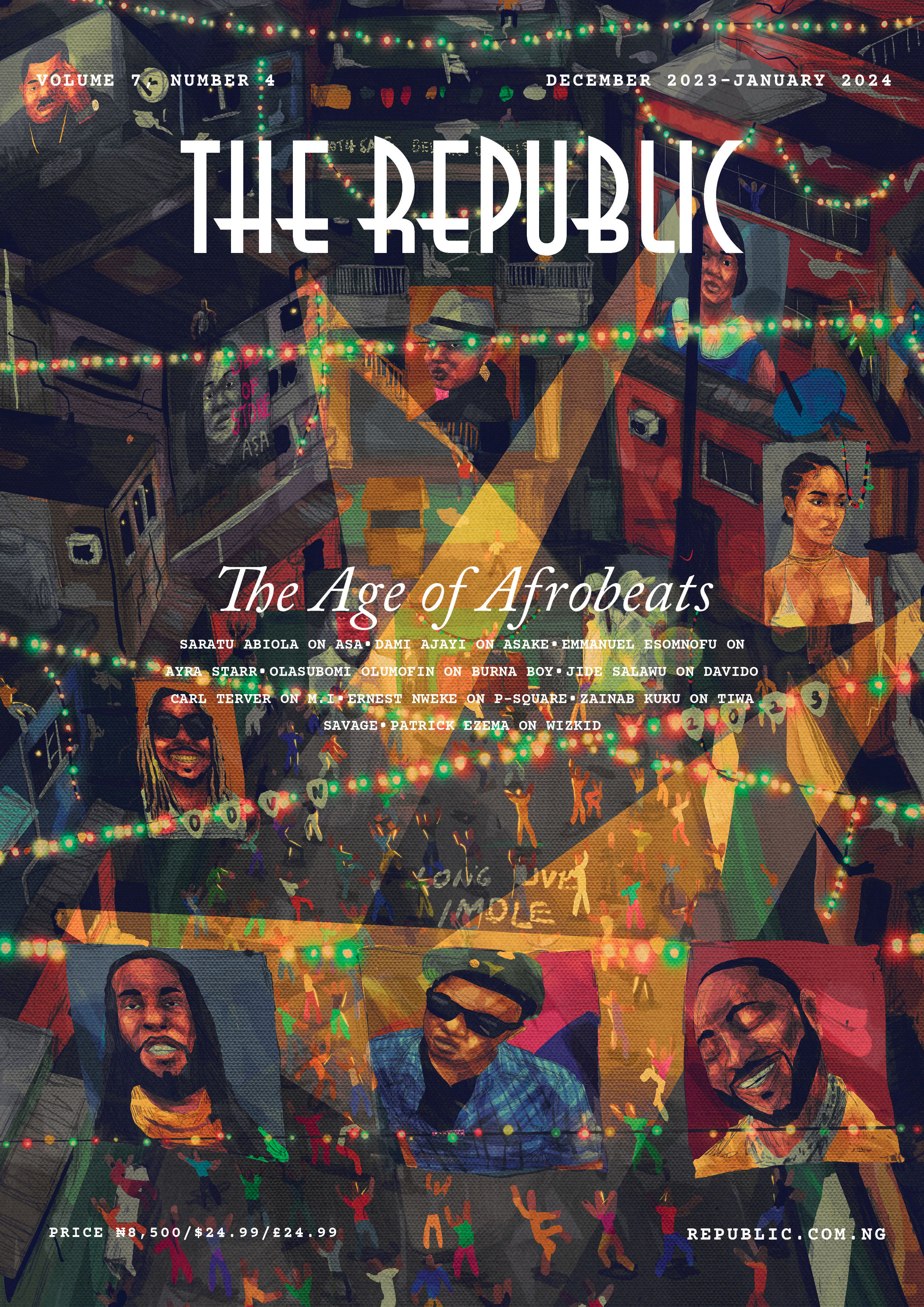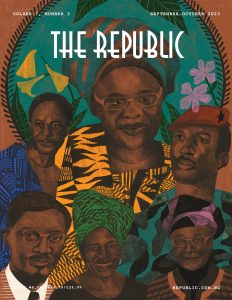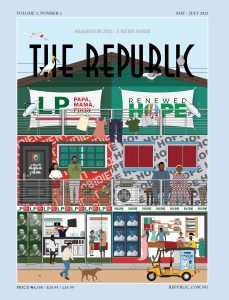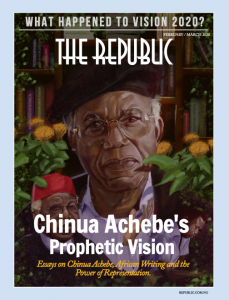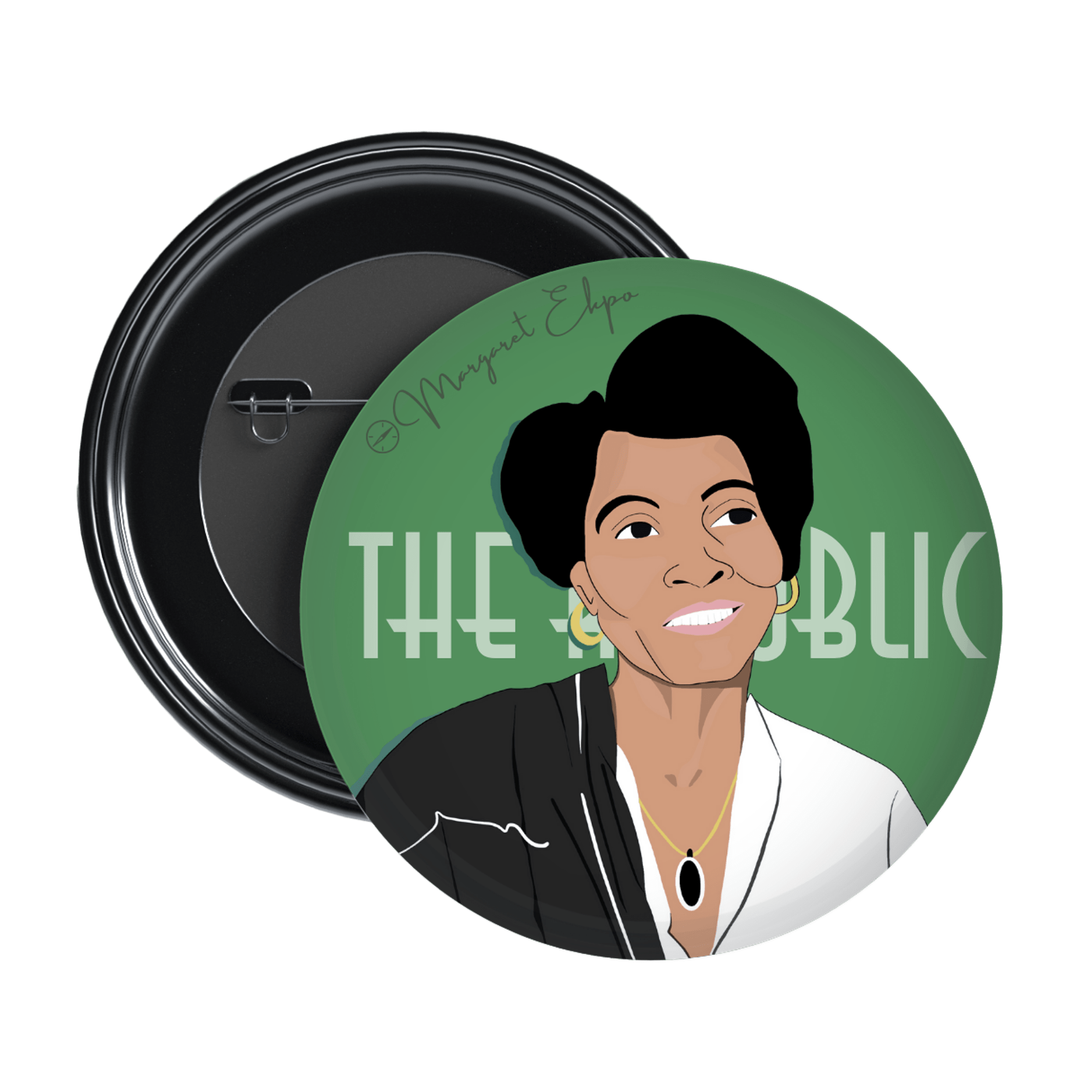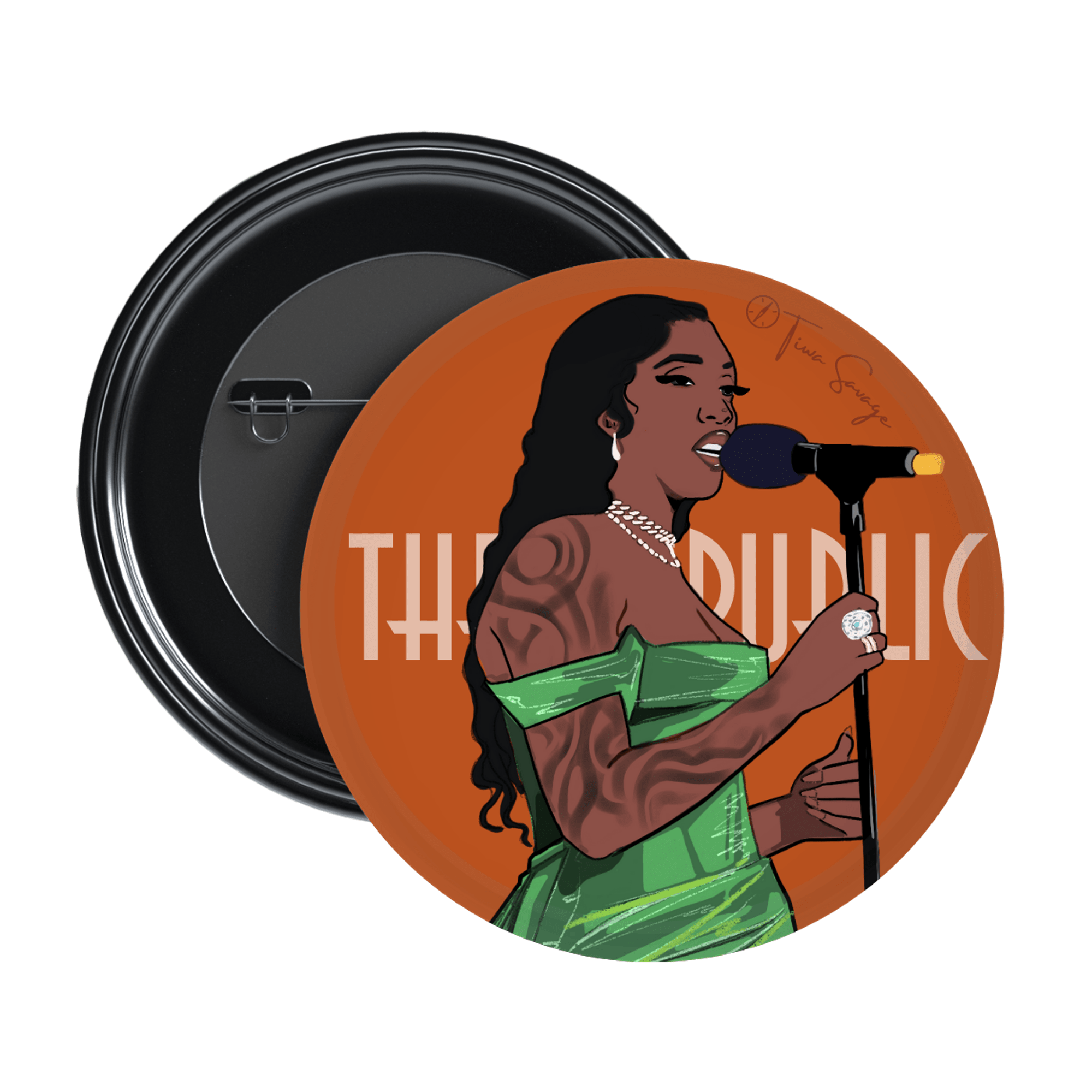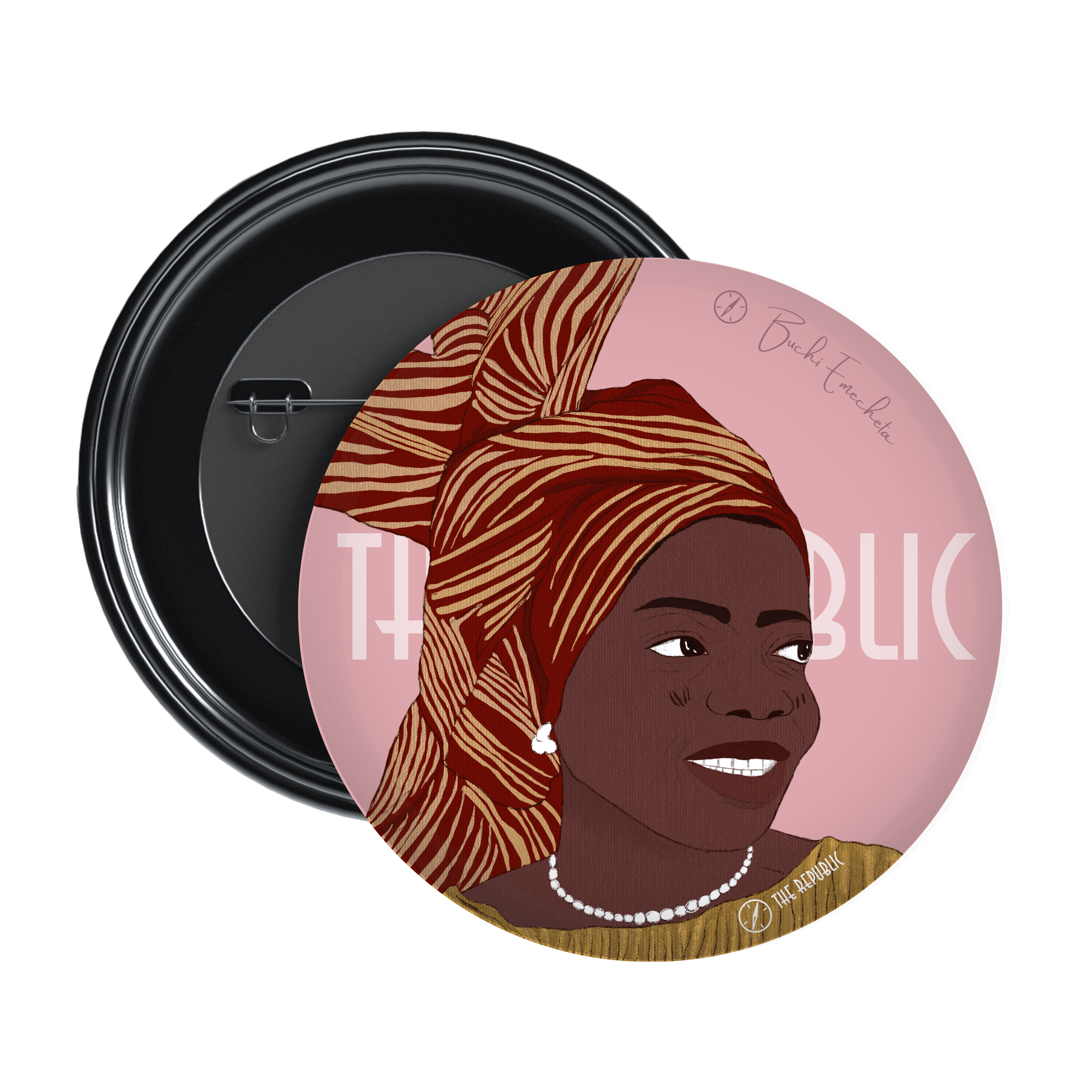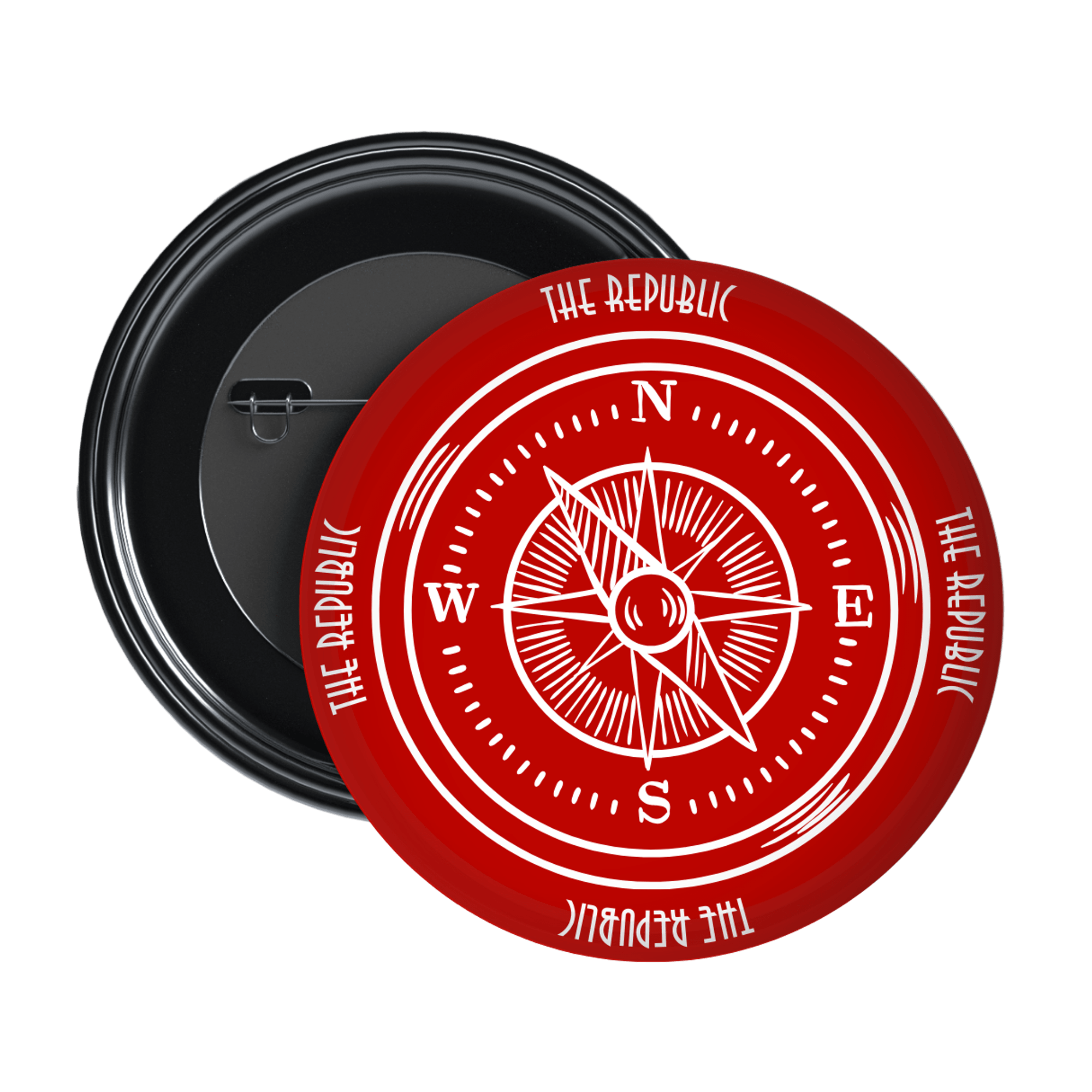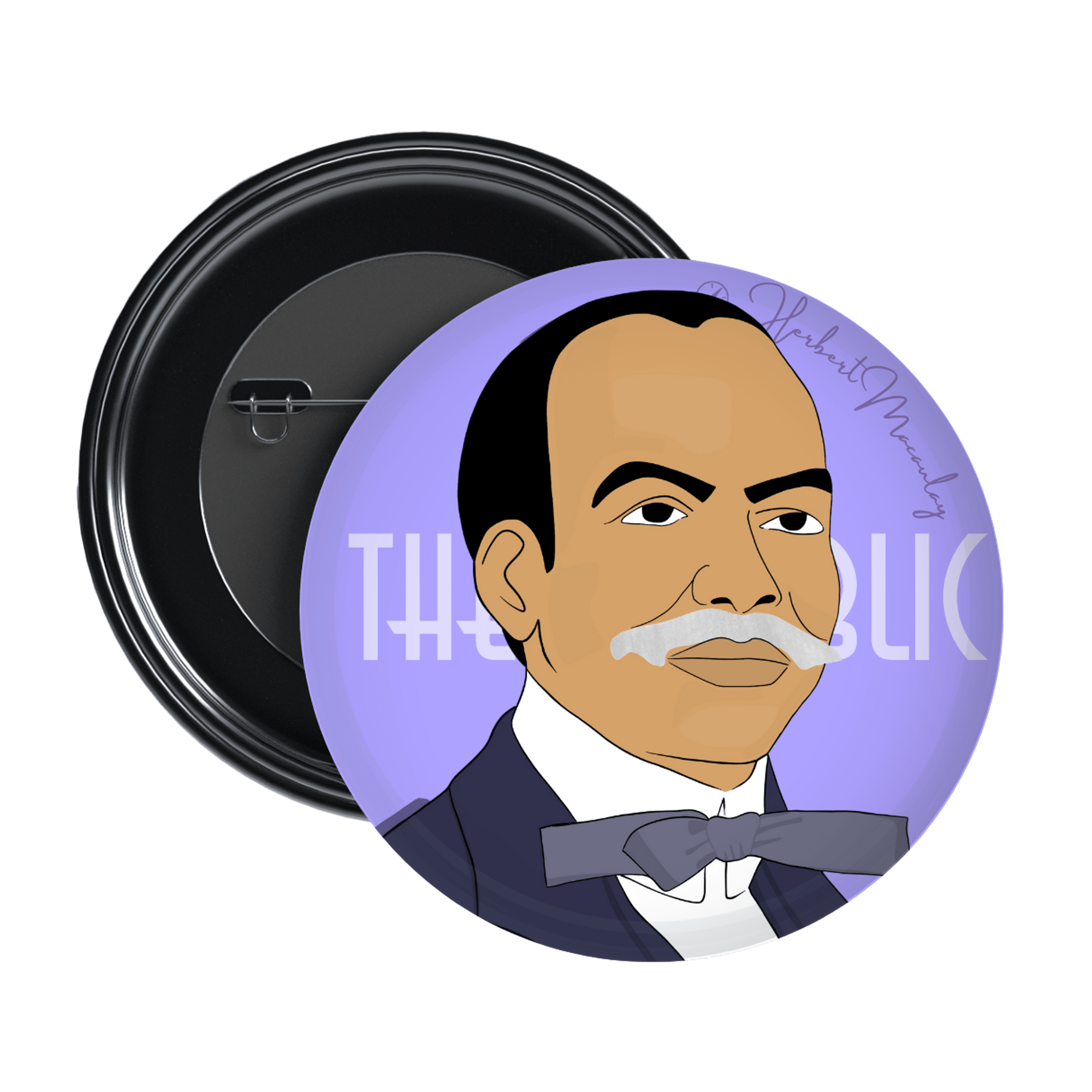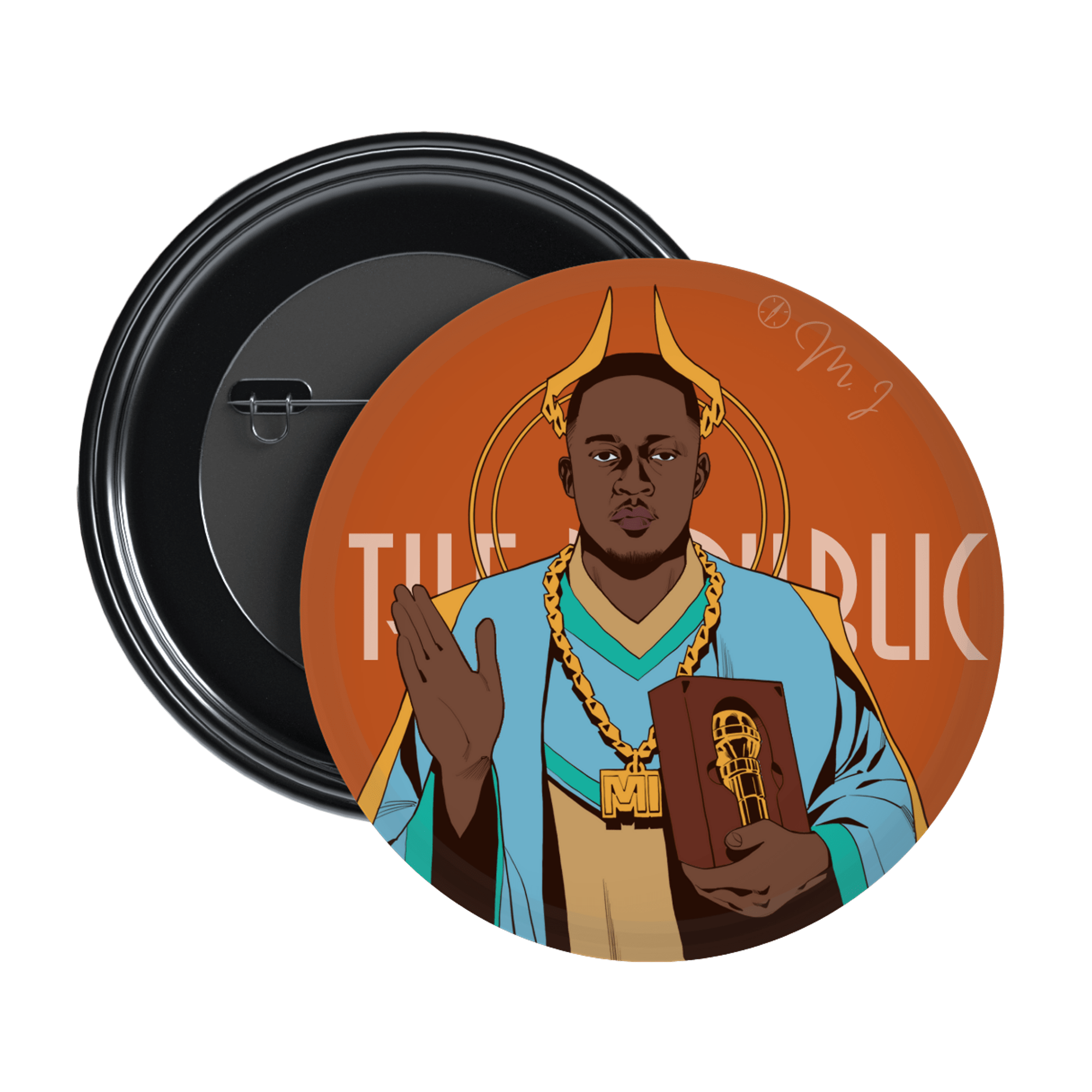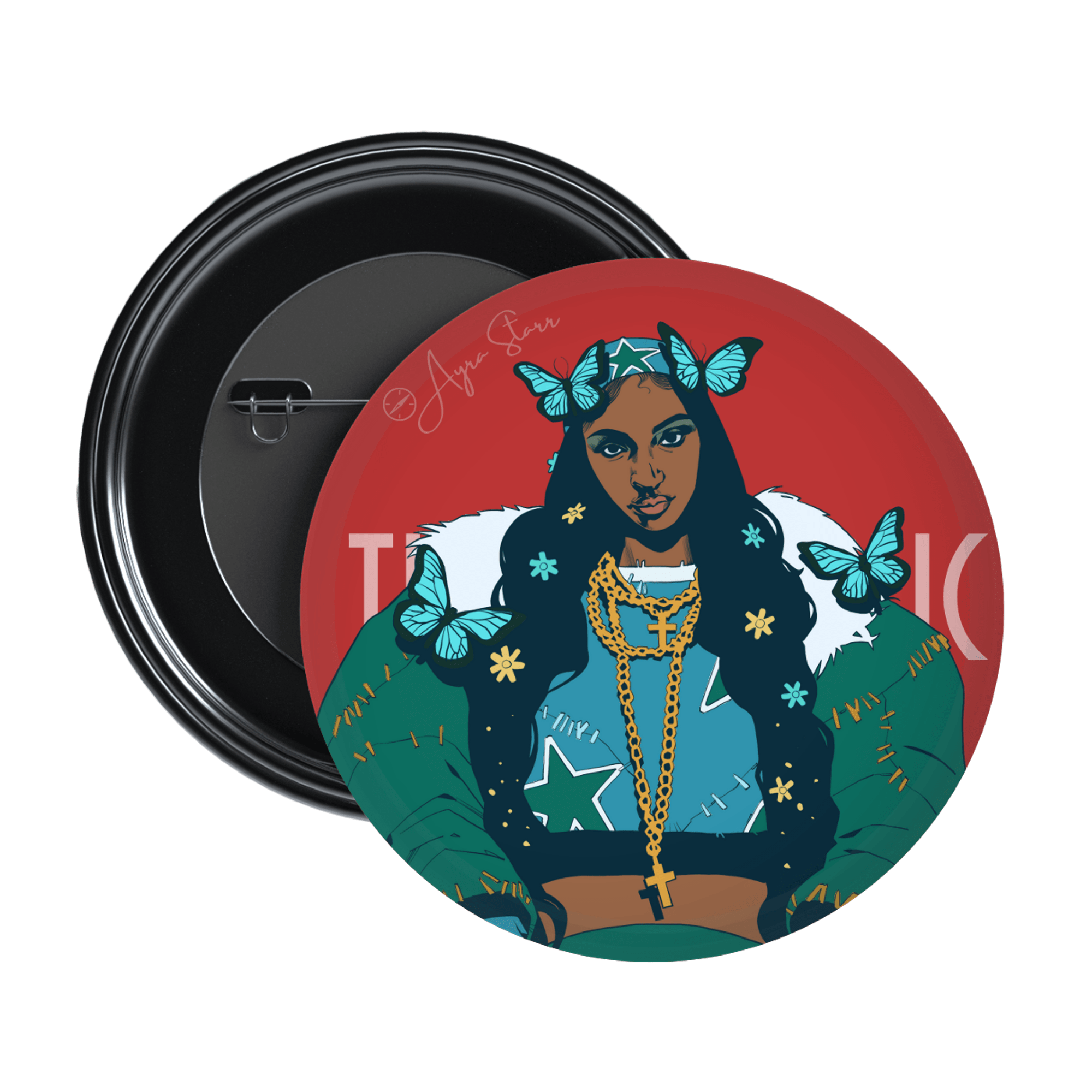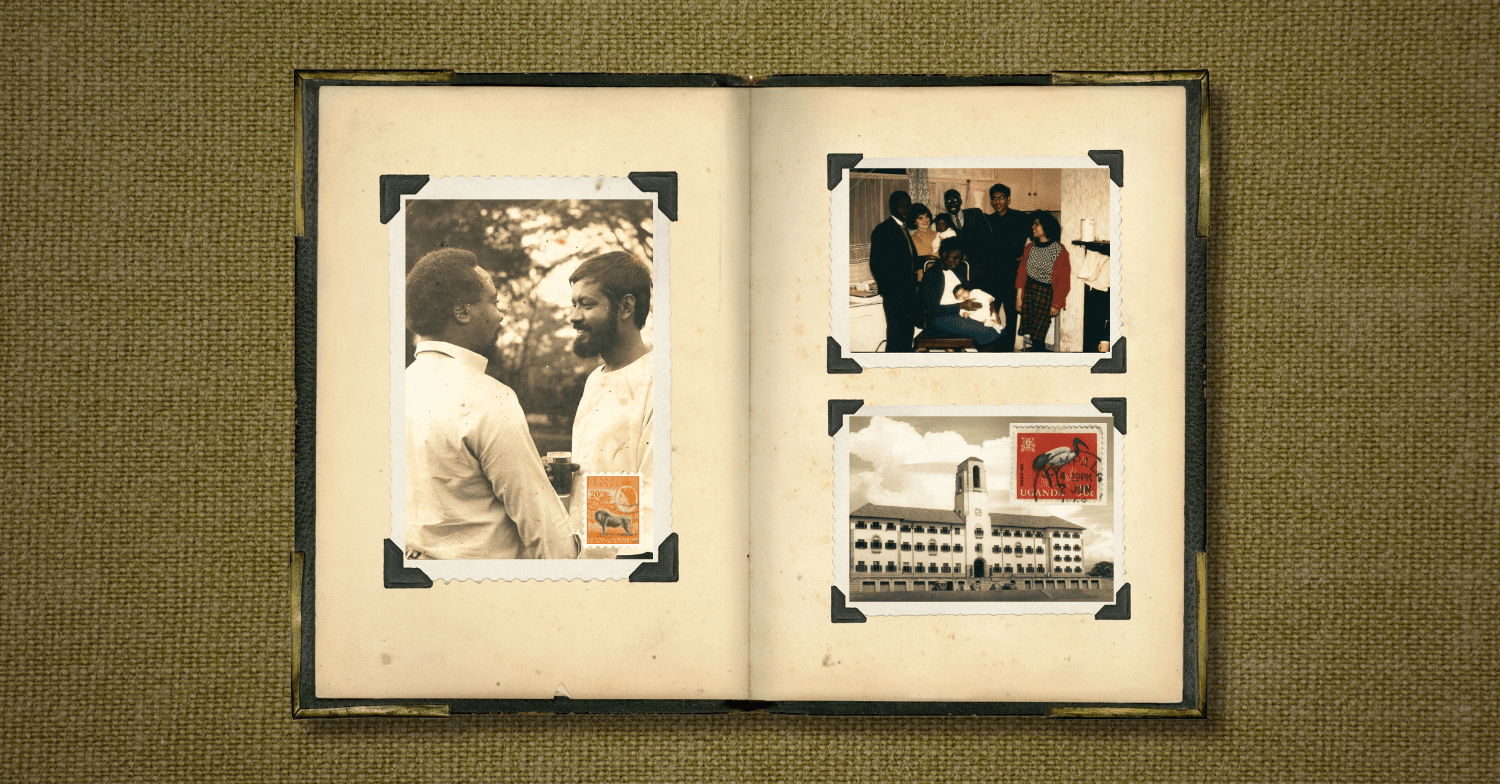
Photo 1: Rajat Neogy with Robert Serumaga in Kampala, Uganda, late 1960s. Transition Magazine / Facebook. Photo 2: Ngũgĩ wa thiong’o, Elvania Zirimu holding Kathleen Nazareth, unidentified person holding Julia Zirimu, Pio Zirimu, Peter and Mary Nazareth. Source: R Benedito Ferrão / SCROLL IN. Photo 3: Makerere College Kampala, 1960s. Collage by THE REPUBLIC.
DISPATCH FROM UGANDA
Remembering Kampala

Photo 1: Rajat Neogy with Robert Serumaga in Kampala, Uganda, late 1960s. Transition Magazine / Facebook. Photo 2: Ngũgĩ wa thiong’o, Elvania Zirimu holding Kathleen Nazareth, unidentified person holding Julia Zirimu, Pio Zirimu, Peter and Mary Nazareth. Source: R Benedito Ferrão / SCROLL IN. Photo 3: Makerere College Kampala, 1960s. Collage by THE REPUBLIC.
DISPATCH FROM UGANDA
Remembering Kampala
‘There’s something ineffable about great cities,’ Marcus says. ‘Not that Kampala is one,’ he adds. ‘But yes, great cities have a personality they take on—a personality that’s disconnected from the collective personality of its inhabitants.’
— Derek Lubangakene, The Unfinished Manifesto
John Nagenda died in March 2023, and I got on a bus and went to Kampala. In Kampala, in the evening, I walked through the Makerere University campus where Nagenda and other members of his cohort had first emerged as writers. It was five in the evening, and the sun, getting lower in the sky with each moment, was blazing. There were very few students out on the campus that day, the university empty because of Easter. I walked past the McKinnell Knowledge Centre, and further on, the School of Dentistry. Makerere was very green, the trees old and leafy—the perfect colonial garden city.
Just before I’d left Nairobi for Kampala, a book I’d ordered had been delivered to me. Nagenda’s The Seasons of Thomas Tebo, a novel which he had written as an allegory of the Uganda of Idi Amin and Milton Obote, was out of print, but I’d gotten a second-hand copy shipped to me in a roundabout way—from France across the channel into Britain, then to the United States, whereupon a friend acting as final courier brought it to me.
Nagenda intrigued me. When I’d spoken to Ngũgĩ wa Thiong’o a few months prior for a profile I was writing about him, he’d talked about Nagenda, and mentioned how integral Nagenda’s writing had been to his own career. Ngũgĩ told me, ‘John Nagenda, oh my God. I don’t know if it’s as good as I thought it was, but you should read “And This, at Last”. Oh my God, that story.’
In the story, a two-pager which was published in the second issue of Rajat Neogy’s Transition, a young reporter goes to interview an old man who has gained a reputation as a bit of a recluse. The reporter is ‘bright and eager-looking, but dead scared inside.’ The old man lives in a ‘house full of old memories of voices now forever silent and faces gone, still and empty’. It is a tightly-woven piece of prose, rather like a Raymond Chandler short story. The old man’s memories are ‘so powerful that he carried the boy with him and together they winged their way into the past, the one realistically, the other by hearsay, with his imagination.’
And now Nagenda, the genius behind this story, was dead, passed away after spending the past three months in hospital. And here I was, walking through the university where his writing, as well as those of an entire wave of East African writers, had flowered.
WRITING IN THE MAKERERE ENGLISH DEPARTMENT
Founded as a technical school in 1922, Makerere is East Africa’s oldest university. Part of its prestige lies in the fact that the first prime minister of Uganda, and several East African presidents were students there: Uganda’s Milton Obote, Kenya’s Mwai Kibaki, and Tanzania’s Julius Nyerere and Benjamin Mkapa, who was an English honours student alongside Nagenda. Mkapa and Nagenda are part of a group of students whose writing careers were sparked in the corridors of Makerere in the late fifties and early sixties. In addition to them were the distinguished critic, Peter Nazareth, the Kenyan poet, Jonathan Kariara, the Malawian writer, David Rubadiri, Ngũgĩ, and Pio and Elvania Zirimu who met at Makerere and got married to each other. But it wasn’t just the students. Writers like Nuruddin Farah, Paul Theroux and V. S. Naipaul were stationed in Makerere at different points in their careers. The literary activity at Makerere seeped into Kampala, Uganda’s capital, and made it one of the main centres of literary creation in Africa. The poet, Okot p’Bitek, Barbara Kimenye who was the private secretary of Kabaka Edward Mutesa II, and would soon gain prominence as a children’s writer, and the fiery South Sudanese intellectual, Taban Lo Liyong, were also present in Kampala at this time.
In Kampala, literary production revolved around two literary magazines. The first, Penpoint, was run by the English Department at Makerere, and Kariara, Nagenda, Nazareth and Ngũgĩ were, as students, part of early editorial boards of the journal. Then there was Transition, founded by the 22-year-old Rajat Neogy in Kampala in 1961. Neogy, despite the tenderness of his age and that of his journal, quickly managed to make it the centre of cultural expression in East Africa. Ngũgĩ has described Transition as ‘the intellectual forum of the New East Africa’. Among early contributors to the journal were the Makerere English set, the circle of writers from Ibadan including John Pepper Clark, Christopher Okigbo, Wole Soyinka and Chinua Achebe, and Zambia’s Kenneth Kaunda, Obote, the first prime minister of independent Uganda, and Nyerere, the first president of Tanzania. Appearing in its pages too were a bevy of global heavyweights: Langston Hughes, Theroux, Nadine Gordimer, and James Baldwin.
But Makerere was the true North of Kampala. Makerere was so attractive that Micere Mugo, later to become one of East Africa’s foremost poets, turned down admission to Oxford University in England because she wanted to be in Makerere, where everything was happening. The historian, Ali Mazrui, once declared that no university in East Africa produced more writers than Kampala. The core of this production occurred in the 1950s and the 1960s, with the earlier generation of Rubadiri, Erisa Kironde and Rebecca Njau mentored by the English scholar, Margaret MacPherson, while a later cohort—Nagenda, Ngũgĩ, Nazareth, Kariara and the Zirimus—came under the tutelage of David Cook. In fact, in 1965, Origins East Africa, an anthology of writing by Makerere writers, was published as the 15th title of the Heinemann African Writers Series. In the introduction, Cook, who had compiled it alongside Ngũgĩ, wrote, ‘I had become convinced that many students who seek to study English at Makerere (perhaps the same is true of all African university colleges) do so because they themselves want to write.’
One of Ngũgĩ’s foundational Makerere memories was of meeting Kariara, whose writing he idolized. One afternoon, with Ngũgĩ gaining a reputation as a freshman student with strong opinions, an English honours student approached him. ‘You must be the Ngũgĩ we’ve been hearing about,’ he said. Ngũgĩ couldn’t speak. Kariara the star writer, speaking to him, imagine. He was quiet. A few days later he met Kariara again and asked him if he could send him a piece of fiction he’d been working on. After Ngũgĩ sent it, Kariara praised the quality of the writing but also disparaged it as a story. There’s a difference between an episode and a story, Kariara said. What he, Ngũgĩ, had written was merely an event. ‘The woman is beaten. She runs away. So what?’ Kariara said. Ngũgĩ went and revised and revised and the story was published in Penpoint in December 1960 as ‘The Fig Tree’.
PETER NAZARETH REMEMBERS KAMPALA
For a few months in 2022, I was an International Writing Program (IWP) fellow at the University of Iowa. Before I flew to Iowa, the Kenyan writer Khadija Bajaber whose first novel won the 2022 Ursula K. Le Guin Prize for Fiction and who had taken part in the IWP fellowship some months before me, took it upon herself to be my guide to Iowa City, giving me a list of things I had to do in the city: where to eat, what to eat, where to hire bicycles, how the public transport worked, and other pieces of logistical advice. But, more importantly, she urged me to meet Peter Nazareth and his wife, Mary. Peter lived in the city and was an excellent trove of information about the East African writing scene. And, beyond this, she added, he was such a nice man to talk to. And so, some months later, I found myself in their kitchen, remembering Kampala with the Nazareths.
The Nazareths live in a grey bungalow in the suburbs of Iowa City. They’ve lived in the US since the seventies when Idi Amin expelled Uganda’s Asian population from the country. Outside their house, flowers bloomed in shades of yellow, red and purple. There were huge tomatoes next to the flowers, and Mary mourned at their sheer size; they had grown so big they had buried all her roses.
The first time I went to their house, Peter insisted that he had to show me his books. He took me down the stairs into his library, each step slow and careful, for a tumble would have been disastrous for a man of his age. Peter had given out most of his books but the ones that remained were the ones dearest to him. He showed me the Ngũgĩ shelf, where some copies were still by James Ngũgĩ, the name the Kenyan writer had written with before dropping his English name. He pulled out Wizard of the Crow, Ngũgĩ’s 2006 opus. ‘I am responsible for this,’ he said. ‘I accused him of not being funny in his writing, and then he wrote this, which is one of the funniest books I’ve ever read.’
He pointed me to other books. The Kenyan writer Yvonne Owuor’s books were next to Ngũgĩ’s. Peter asked me if I knew her. I told him I did. Then he walked to another part of the room and pulled out a photo. It was a black-and-white photo of him with another man. He asked me if I knew who that was. I didn’t. He shook his head sadly. ‘Very few do,’ he said. ‘That’s Pio Zirimu. He died early, as did his wife, Elvania.’
Any literary exegesis of the writing produced by the David Cook generation at Makerere has to proceed through two channels: Penpoint and the Makerere inter-hall drama competition. Penpoint was started in 1958, and the founding editorial board was comprised of Nazareth, Michael Woolman and Michael Kaggwa. In 1959, Nazareth became editor, and when he left, Ngũgĩ, a year behind though two years older, succeeded him as editor.
Then there were the plays. The first writing prize Ngũgĩ ever won was in Makerere. In 1962, his play ‘The Wound in the Heart’ won the inter-hall drama competition. However, according to him, it only won because both Nazareth and Kariara had graduated from Makerere by then, and they could no longer deny him the prize—Nazareth had won it in 1961 with ‘Brave New Cosmos’, and Kariara in 1960, with ‘The Green Bean Patch,’ a play which starred the future Tanzanian president, Benjamin Mkapa. Then, after Ngũgĩ, Elvania Zirimu’s ‘Keeping up with the Mukasas’ won the competition.
I asked the Ugandan writer, Jennifer Makumbi, (who herself got her start as a writer first as a playwright) about these plays, and what it meant that the literary production in Uganda revolved around theatre, and she told me, ‘Theatre and poetry are traditional forms in Uganda. They are readily accessible via our cultures. In Buganda, there had always been katemba (drama) and banakatemba (actors) in the palaces entertaining the Kabaka.’
She added, ‘I am so grateful to drama because it is the only form that saw my country through the turmoil of the late 60s, the terror of the 1970s, the wars and scourge of the 80s and 90s.’
I thought about this as I walked through Makerere. Kampala is a city of hills, and as I walked up Makerere Hill I cursed whoever had the idea to build a city on a hill. I walked past Mitchell Hall, which is where Nazareth had stayed (Ngũgĩ had been in Northcote Hall, Kariara and Mkapa in New Hall, and Elvania in Mary Stuart Hall). There was a fleet of giant marabou storks perched on the roof of the hall. On the grass outside it, a student was on his laptop, while another talked on the phone next to him as I walked on, past the Julius Nyerere Leadership Centre, which was on a flat road. On the walls of some of the buildings were faded campaign posters of student union contestants, and in the distance the sound of a trumpeter. Everything was delightfully green, and I walked past the delightful pink whoosh of a bougainvillea tree heavy in bloom. Now I was in a residential area, the houses bigger now, more cottagey, more colonial. One of the houses was being used by the Confucius Institute. Another had the sign the sign of middle-class hysterical security theatre on its fence: Umbwa Kali. Fierce dog. Of course, the word for dog was misspelt.
shop the republic
A ‘COMMUNITY IN FOREIGN TERRITORY’
Peter and I went back upstairs. We sat in the kitchen, the two of us and Mary, a pot of tea and a plate of biscuits before us. In the background was some jazz: Louis Armstrong’s ‘St. Louis Blues’. Peter had performed with Armstrong when the older man had played in Kampala in 1960. One of Peter’s desires back then had been to be a professional musician, and while at Makerere he had a band that was initially called the Teddy Bear Band (after Elvis Presley), before being renamed the Makerere Jazz Band. In this guise, he’d played with Armstrong, and the jazz maestro had told him to look him up if he was ever in America and wanted to play together. He laughed as he told me this. He never did look up Armstrong, as by then he had serious doubts of his abilities to play music professionally. Instead, he became a music scholar and in his decades in America garnered some critical renown for his work on Elvis.
He took a swig of his tea. His long black hair was a thing of the past, replaced by a short grey monoculture. He talked some more about his friendships with the Makerere cohort, particularly Ngũgĩ, the Zirimus, and Kariara who he had been close to. ‘Such a nice, nice man,’ Mary said. In 1982, decades after Makerere, Kariara had gone to Iowa as an IWP scholar. Both Mary and Peter worked for the University of Iowa, Peter as a professor in the English Department, and Mary as an administrator for IWP. Naturally, Kariara spent as much time as possible with the two of them. One afternoon, he and Peter held a seance together. Kariara ended up talking to his two sisters, both of whom had passed away. Peter laughed as he recalled this memory. They were speaking to Kariara in Gikuyu, he told me.
Of the core Makerere writing circle, Kariara and Nagenda were the only ones not to go to graduate school afterwards. The Zirimus, Ngũgĩ and Nazareth all ended up in Leeds together. They were joined there by another Makerere alumnus, Grant Kamenju, and the five of them, together with a few other students, became what Nazareth called a ‘community in foreign territory’. They shared similar interests, all wrote for Transition, and all got radicalized in Leeds by the same writer—Frantz Fanon. In fact, it was the same copy of Fanon’s The Damned (later republished as The Wretched of the Earth) that was responsible for this radicalization. Kamenju had gone to Paris where he bought a copy of the book. When he came back to Leeds, this copy was circulated among their small circle of friends and eagerly thumbed through. After Leeds, Ngũgĩ joined the faculty of the University of Nairobi, Piu Zirimu Makerere’s, and Kamenju the University of Dar-es-Salaam’s. Within a few years of each other, the three had all led revolutions that led to the English Departments of all universities changing the focus of their study from English Literature to the oral and written literatures of Africa.
It is noteworthy that this revolution occurred at Leeds, and not in Makerere. Makerere was in the business of producing an elite which was intended to serve the colony. As Carol Sicherman has pointed out,
True, Makerere encouraged creative writing, but the means of encouragement were culture-bound: founding English-style magazines, conducting literary contests, and presenting as models of creative work not the oral literature naturally suffusing East African cultures but imported classics of European literature (Greek plays, Synge’s rural dramas). These methods bore little ripe fruit aside from Ngũgĩ’s first two novels.
Hence, Nagenda and Kariara, the most gifted writers of this David Cook cohort, purely Makerere-trained, had produced no novels. Instead, p’Bitek, independent of Makerere, had become the dominant East African writer in Kampala, producing an opera in Acholi while in high school, writing a novel in Acholi in 1953 (Lak Tar Miyo Kinyero Wi Lobo), and publishing the iconic Song of Lawino in 1966. However, in the background of p’Bitek’s productivity, a literary scene had flowered, bookended by Rajat Neogy’s Transition.
‘WE ARE AFRICAN. WE ARE CLEVER. WE ARE PROVOCATIVE AND ORIGINAL.’
Neogy once wrote,
I always find it very difficult to summarize what the magazine is, in fact, trying to do. It is essentially a cultural magazine. It’s a literary magazine. It’s also, I think, a sociological magazine, in that it tries to present what is happening in East Africa from nearly every possible point of view; through economics, through art, through sociological documents, through politicians’ speeches. And the idea is really to see and feel and hear what contemporary East Africa is doing, thinking, and acting upon.
Throughout the sixties, Transition became the way to know how East Africa, particularly intellectual East Africa, was doing.
Neogy was born in Kampala in 1938, and his family was one of only six Bengali families in the whole of Uganda. He went to school in Kampala, then went to University College London in 1956—he didn’t finish this degree. Instead, he went back to Uganda, and within a few years, he had started Transition. This was the second magazine he started. His first attempt had been Friends magazine when he was a student at Old Kampala Secondary School.
Soon, a vibrant scene developed around Neogy. Neogy succeeded in gaining influential friends across Kampala, and these friends ranged from senior Ugandan politicians like Obote, Daudi Ochieng’ and Abu Mayanja, to the Kabaka, Edward Mutesa, to the writers emergent from Makerere, to the writers who moved to Kampala and fell in love with the country (Paul Theroux), to quasi-Ugandan writers like Taban Lo Liyong, and to Ugandan writers like p’Bitek and Barbara Kimenye. All these figures would gather in his house in Kololo for the parties he used to throw. Nazareth told me about these parties and the happy memories they held for him: Neogy reading his poetry in one corner, Kimenye and Ngũgĩ in conversation in another, p’Bitek drunk and asleep through it all. In Birth of Dream Weaver, Ngũgĩ writes about the first time he met Kimenye in Neogy’s house.
It was at one such party that I first met Barbara Kimenye. Whether making an entrance, sitting down, or moving around the room, she talked and interacted with guests with the ease of one who was aware of her looks and dress, indeed one who accepted the fact that all eyes, male and female, were fixed on her person and motion. […] I was surprised when she came over to where I sat, told me she had read my story in Transition, and talked to me as if I was an established writer. It became a habit: every time we met at Rajat’s parties, she would find the time to sit by me and talk about writing.
Kimenye was certainly an attractive figure in Kampala. She was the Kabaka’s private secretary and had become Ugandan by willing that she was Ugandan. Born Barbara Clarke Holdsworth in England to a white mother and West Indian father, she married a Tanzanian man called Bill Kimenye, from whom, when the marriage collapsed, she had gotten two sons and a last name. She moved to Kampala, where broke, she did several jobs to support herself and her children, including modelling. She soon came to the Kabaka’s eye. The historian, Anna Adima, writes:
Her reputation preceded her in Kampala, and Kabaka Mutesa had already been made aware of her arrival in the city by his brother, Prince Henry Kimera, of whom it can be assumed—though sources do not directly indicate this—that he knew Kimenye through the small East African circle in London.
She was invited to his palace, and in due course had become his secretary, though many in Kampala assumed that they were also lovers, a story whose fuse was lit by how close they were, and by the Kabaka’s reputation as a philanderer.
Kimenye held secret writing ambitions, which was why she kept on going to Neogy’s parties, and why she would seek out Ngũgĩ, who was still a student at Makerere. Everyone around Neogy did, even Obote who would soon become the first prime minister of independent Uganda (Mutesa became president). Obote wrote for Transition and read through the issues of the magazine. Theroux described a meeting with Neogy one evening in Kampala, where, ‘from the jaunty way he moved I knew he had something on his mind that he was bursting to tell me. “I’ve just seen Obote,” he said—Milton Apolo Obote was the prime minister; his office was in parliament. He leaned across his desk and said, “Who is this, Paul Theroux?”’
Theroux goes on:
I laughed at the thought that the big man knew my name—indeed, that this megalomaniac (as he proved to be) had read something I’d written and was obviously annoyed by it. Rajat was happy, too. His magazine was widely read among the cabinet ministers and the government generally. Our mission was to be provocative; and it seems we had succeeded. I was twenty-five, Rajat three years older. It is bliss to be an irritant at that age, and now that I think of it, being an irritant is bliss at any age.
Certainly, being irritants was good for the reputation of Neogy and of Transition. Neogy was profiled in the New York Times, received a lot of money from donors (including the CIA through a shadow organization, though no one at Transition knew that it was CIA money), and was flown to New York, where he met all sorts of American literary celebrities. Theroux wrote of that period that, ‘We are African. We are clever. We are provocative and original. But we are indigent. Of course, people want to give us money.’
In the pages of Transition, the politics of Uganda, and of African countries, dominated. Kagayi Ngobi, the author of The Headline That Morning, told me, ‘For a country that was trying to perform democracy, Transition became a space for state actors to have intellectual battles.’ Like many newly independent African countries, there wasn’t a clean divide between the intellectual class and the political class, and many of their battles found their arena in Transition. Daudi Ochieng, who was not only a close ally of the Kabaka, but also between 1965 and 1966 was chief opposition whip in Parliament, was a frequent contributor, and his writing was present in the first issue. Kabaka’s party was called Kabaka Yekka (KY), and Ochieng’ was the secretary-general of the party. Present also in Transition was Abu Mayanja, another of the Kabaka’s men. Mayanja was one of the founders of the Uganda National Congress (UNC), Uganda’s first political party, and in 1959, he and Obote were expelled from UNC because of their attempts to revamp the party. After independence, he broke with Obote and became a leading KY politician. At the heart of the break between KY and Obote was Obote’s quest for control over Uganda, and in essence, over the Buganda Empire. Nagenda, the grandson of one of the richest men in Uganda, didn’t write about this politics in Transition, despite his position as an insider. His grandfather had been one of Mutesa’s co-regents and the Nagenda family was very influential in Buganda. Instead, he wrote short fiction and played cricket.
shop the republic
‘WE DID NOT KNOW WE LIVED IN PARADISE’
‘We did not know we lived in paradise,’ the historian Sam Lunyiigo once said about Makerere. This statement could have been said about Kampala too, which was one of the intellectual centres of Africa. The writing scene was vibrant and alive, and its only rival in eminence was Ibadan. Then 1966 happened.
In February 1966, Ochieng’ tabled an urgent motion in Parliament. This motion followed an earlier claim he had made in March of the previous year accusing Idi Amin, the deputy commander of the Ugandan army, of receiving stolen gold, ivory and coffee from the Democratic Republic of Congo. In his new motion, he doubled down, this time accusing, among other people, Obote of being in cahoots with Amin in the theft. Obote was enraged. As Kagayi told me, ‘When Daudi Ochieng’ took his criticism from Transition to parliament, the pretence of being the intellectual president wore off.’
This was the beginning of the end of Kampala as one of Africa’s intellectual centres. Shortly after the accusations were made, Obote seized power, overthrowing Mutesa as president. In June, Ochieng’ died, ostensibly of stomach cancer, though there were rumours of having been poisoned by Obote. A few months later, Obote engineered a new constitution that got rid of the federal government of Uganda and established a new one with him as president. In the August/September issue of Transition, Mayanja published a repudiation of this new constitution, criticizing the coalescing of power around a new imperial presidency. In the next issue, Obote’s government responded through Naphali Akena, who in his position as head of the Security Council was the second-most powerful person in Uganda, defending the new constitution. In February 1968, Felix Onama, the defence minister (and one of those implicated in the gold scandal) warned Neogy that Transition was subversive and that the government would soon deal with it. At the end of the year, Mayanja and Neogy were arrested. It would have been funny if it wasn’t tragic: Obote had arrested his old editor. The Financial Times in England described this as ‘Obote’s showdown with the intellectuals.’
Four days after his arrest, Neogy was informed by his captors that he would be stripped of his Ugandan citizenship. Obote proposed a coup of Transition, suggesting that Ali Mazrui become editor instead. Mazrui refused the offer. As Barbara Neogy Lapcek (Neogy’s then wife) wrote in 1971, Obote, in reference to Neogy’s arrest, said that, ‘Transition was being debated these days as if it were bigger than Uganda, although Uganda was not that small.’ Furthermore, ‘No action had been taken against the magazine, Obote claimed, although action had been taken against its editor.’
Still devoted to the myth of himself as an intellectual president, Obote claimed that Transition had nothing to do with Neogy’s detention, saying that the arrest was because of other reasons, in particular, his association with certain unnamed organizations. In the same way, after p’Bitek had published an essay in Transition where he said that all African governments were, ‘without exception’, dictatorships, he was, Barbara Neogy writes, ‘relieved of his duties as director of Uganda’s National Cultural Center, ostensibly for other reasons.’
In November 1968, Obote published an essay—‘Letter to a London Friend’—where he defended his actions. In the essay, you can see it, the Makerere English inflection, the gift of garb that made him a darling in anti-colonial circles in Nairobi in the late fifties. He writes,
The arrest of Neogy and Mayanja, for instance, is being seen in London, and perhaps elsewhere, within the context of the myth that has been the fundamental element in London’s assessment of our policy and actions. It is, for instance, being reported that we are afraid of intellectuals and that we do not want our policies and actions to be criticised.
Later, he adds,
It would appear that most people who have reacted on the arrest and detention of Neogy and Mayanja, though aware of these writings against Uganda, do also hold the view that it is not a bad thing to run the Government down, or to accuse it of what it has not done and generally make the world believe that Uganda is a country where life and property are not safe.
In prison, Neogy was in solitary confinement for five months. He wrote, after his release, ‘The most frightening thing about detention is its arbitrariness and its suddenness, even if you are prepared for it. Like death, you think it only happens to other people.’
Mayanja stayed in prison until 1970, while Neogy was only released in March 1969. Thereafter he and Barbara fled first to Greece, then to Accra, where the final 13 issues of Transition were published under the editorship of, first, Neogy then Wole Soyinka (himself newly released from prison in Nigeria). But stripped of Kampala, Neogy floundered, having lost his essence in the country that had stripped him of his citizenship. Soyinka recalling this period, in 1996:
As a former sojourner in like places, I sensed this space of loss, of lostness, each time we interacted, even at his most energetic, innovative, or simply convivial, and no matter the occasion or place—Paris, London, but especially in Accra. Something had snapped in Rajat’s sensitive soul, like one who had looked into the heart of evil and found the harmony of existence permanently untuned.
After a few years, in 1976, Transition ceased publication and Neogy moved to America. Theroux writing in 2011 recalled,
He and Barbara divorced and within a few years was in America—San Francisco—where he ended his days in poverty. I saw him then, too; he was very fragile, dazed-looking, living on welfare; but he had plans. I introduced him to some of my friends there, we went out for drinks.
In San Fransisco, Neogy wrote again, got married again, and founded another magazine—a neighbourhood paper. When he died, in 1995, it was in penury, but at least by then Transition had been revived at Harvard by the American intellectual, Henry Louis Gates Jr. He got to see it alive again.
shop the republic
‘1966 WAS THE FIRST CRISIS FOR NAGENDA’
What then, of Nagenda? Where was he in all this? Charles Onyango-Obbo, a Ugandan journalist and editor, who, like Neogy before him, was charged with sedition by the Ugandan government for running material the government did not like (in his case Museveni’s government), told me that, ‘1966 was the first crisis for Nagenda.’ In his overthrow of Mutesa and his subsequent abolition of the kingdoms, Obote had removed Nagenda’s main connection with Uganda. Nagenda moved to London. There, he stopped writing, and became a cricketer.
In his house, Ngũgĩ and I looked at Nagenda’s Wikipedia page. Ngũgĩ was sad about how short and pithy it was, and how he was mostly remembered as a cricketer, not a writer. I wrote to Nazareth, telling him about this, and he wrote back, ‘John Nagenda was my classmate at Makerere. He also was captain of our cricket team. I remember the time I dropped a catch and then almost immediately caught a catch to Nagenda’s praise. He had a good sense of humor.’
Nagenda was an excellent cricketer. Exiled in London, he played first-class cricket. He also played at the Cricket World Cup, one of only two Ugandans to ever do so—he and Sam Walusimbi were part of the East Africa Select Side at the 1975 World Cup. A right arm fast medium bowler, Nagenda’s arm was once described as the fastest in East Africa.
But the cricket was, to some observers, a mask for the turmoil that Obote’s abolition of the kingdoms had done to him. In Uganda, because of his family’s privileged position in Buganda, Nagenda had been part of Kampala’s upper-class elite, and his writing and cricket-playing (and indeed his education at Makerere) were extensions of this privilege. In England, he floundered without the support of this structure. Whereas the Leeds set had gone to England on academic scholarships, Nagenda was there on his own. Onyango-Obbo told me, ‘Cricket, both in Africa and in the UK, is very middle-class and bourgeois. It is not football.’
He wanted to be part of the cricket set that hung out at Lord’s, but he couldn’t afford it. So, he began dating a wealthy British woman who financed his entry into this world. This, Onyango-Obbo said, ‘took away his self-esteem. People called him nothing but a gigolo.’
In London, in the sixties and seventies, bereft of the things and communities that were important to his identity, Nagenda’s writing career suffered. He played cricket and perhaps a more forgiving observer would have offered that Nagenda simply preferred the sport to writing; but to his Makerere contemporaries, the absence of his pen was one of the things Obote, and Amin, who had overthrown his erstwhile ally, had taken away from Uganda.
Peter Mulira, a veteran Ugandan journalist, was once at a house party in London in this period, and he wrote about attending this party in 2020.. The South African writer, Lewis Nkosi, was also there, and when he discovered that Mulira was Ugandan, he came up to him and told him, ‘I understand you are from Uganda. Please tell John Nagenda to play less cricket and write more because he is a better writer than all of us.’
In 1973, Nagenda actually published a book—a children’s book called Mukasa. This was fine, but it wasn’t what had been expected from a writer who Nazareth and Ngũgĩ had pinpointed as the most skilled of their cohort. It wasn’t what p’Bitek, Kampala’s literary force, had accomplished, or even what his old friend Ngũgĩ, who by then had three novels and multiple plays, had done.
But then, who else in Kampala was prolific in this period? When Amin seized power in 1971, the bleeding of the country’s intellectual scene that had started a few years accelerated. Some writers joined in the fighting. The playwright, Robert Serumaga, wrote about Amin’s violence, but eventually tired of this, and took to the bush to fight him. The writers who had stayed in Kampala, fled, mostly to Nairobi. Soon, Nairobi had become East Africa’s literary capital, and Dar-es-Salaam, partly because of the university, and partly because of Nyerere, welcoming of all disenchanted and persecuted radicals, its centre of political thought.
One of the writers who fled to Nairobi was Barbara Kimenye. Kimenye, while working for Mutesa, had begun to stoke her ambitions as a writer, and worked as a journalist, becoming, Adima tells us in a paper about Kimenye’s life, ‘the first Black woman to work as a journalist in East Africa’. Kimenye was one of the Kampala correspondents for the Kenyan newspaper, Daily Nation, where she wrote profiles of figures such as Barbara Brown, the founder of Nomno Gallery, soon to become Barbara Neogy. Under Obote, her position at both the paper and at Uganda Nation, which she also wrote for, became tenuous. This was Obote’s Uganda after all, and after Mutesa was deposed, Kimenye left Kampala. Ngũgĩ, bumping into her in Nairobi, writes, ‘…she looked like a misfit in the streets of Nairobi. In my eyes she still belonged to the Kampala built on many hills […] The Kampala of literary salons and clashing ideas was a thing of the past.’
REVIVING MAKERE ENGLISH
The writer, John Jeremiah Sullivan, has observed, ‘I mean, why would you want to belong to your own generation? It’ll never be half as interesting as one that came before, or as horrifying as the one that’s coming up.’ This is how it goes. The light of those who came before us shines brighter, the dark recesses washed away by the joy of nostalgia. In this case, looking back at this Kampala, I am looking back two generations, four times as interesting as the present.
In 1979, Amin was deposed from power by a combination of Ugandan rebel forces and the Tanzanian army. After a spell of presidential musical chairs, Obote’s UPC won the elections, and he became president. After the violence of Amin, Obote seemed, if not quite a choir boy, then a paler shade of grey. Transition was long gone, but here was a chance for Makerere English to be revived, p’Bitek the totem of this revival.
Ngũgĩ, writing about Nazareth, has described him as the all-Makerere student, because of the wide range of his activities at the school—writer, editor, band leader, cricket player—but p’Bitek is the true all-East-African-writer, a prodigious figure whose astonishing accomplishments were disrupted by an early death. p’Bitek, among other things, composed an opera in Acholi while a high school student at Kings College Budo; played football for the Ugandan national team; wrote a novel in Acholi at 22 (Ngũgĩ was twenty years late); wrote a series of epic poems in Acholi that became foundational to African poetry (Song of Lawino, Song of Ocol, and Song of Malaya); directed arts festivals in Kenya and Uganda; earned degrees in education, law and anthropology; directed the national theatre in Uganda; and his PhD in anthropology, a swaggering attack on the academy for its colonial and incorrect framing of Ugandan cultural history, was reportedly deliberately failed by Oxford for attempting to do this.
Now, after a long spell in exile in Nairobi, p’Bitek was back in Kampala, Uganda’s most important writer, appointed Professor of Creative Writing at Makerere in 1982. His appointment had not been a straightforward thing. He had wanted to return to Makerere, but it was unclear where he would be appointed. Charles Okumu writes,
His first port of call was Makerere University, which promptly appointed him senior research fellow in the Makerere Institute of Social Research (MISR). He rejected the appointment. The problem was, where do you place him—in the Department of Literature, the Department of Sociology, or perhaps MISR? He clearly saw his place in the Department of Literature as a professor of literature.
The poet, Timothy Wangusa, an alumnus of Makerere English, was appointed chair of the department of English, and p’Bitek, denied this post, had a new role created for him.
p’Bitek being back in Kampala was sign that the city could be restored, that the previous decade had been nothing more than a blip. But then a few months later, he was dead, the hard-drinking poet suffering a stroke in his house in Kololo, then being unable to be taken to hospital because the city was not safe enough to drive at night in.
By then, the other luminaries of the 1960s parties in Neogy’s house were long-gone from the city. Neogy, divorced from Barbara, floundered in San Francisco. Kimenye, by then a full-on writer, wrote about Moses and Kalasanda in Nairobi. Nazareth had fashioned a new life for himself in the US, though he kept abreast of things from afar, still in communication with his Makerere cohort. Ngũgĩ was in Nairobi, fresh from prison, soon to be exiled in London. The Zirimus were dead: Pio reportedly murdered on Amin’s orders in 1977, found in his bed in Lagos where he had just been named director of the colloquium at FESTAC 1977; while Elvania’s death two years later had too many circumstantial things around it for Peter and other people close to the two of them not to suspect Amin’s hand—it was a head-on collision with a Ugandan police vehicle that had been driving on the wrong side of the road.
The years went by in depressing staccato. Then, in 1986, two remarkable things happened. First, a quarter-century after publishing the short story that Ngũgĩ told me was the best thing he had ever read, Nagenda published a novel, with Heinemann in London releasing it as Title 262 in the African Writers Series.
Written in a sprawling, almost careless postmodernist style The Seasons of Thomas Tebo is a fascinating book. The first section of the book has a Nabokovian plot, with the eponymous protagonist the victim of his mother’s best friend’s venery. Then, in the next section of the book, we come across an adult Thomas Tebo in London where, exiled from his home country, he helps organize a coup against the country’s murderous dictatorial leader. In the last section, the coup is successful, and Thomas having been sworn to secrecy flies back to London and embarks on a series of ill-fated romantic dalliances with a revolving cast of women. The novel shows Nagenda at his best: the spells of sparkling prose that made his reputation; but also displays the weaknesses that sullied his writing: the fragmented storytelling that makes the book lurch without meaning from one end to the other.
At his finest, Nagenda’s pen enchants us. Here he is, writing about a character’s journey from a city that’s not named (but which we understand to be Kampala) to Mombasa:
For a day and night the train wobbled through the changing countryside, stopping at innumerable little stations where yelling crowds engulfed it, and it climbed up and up to where it was so cold your breath hung before you and there were no more crowds but shaggy-woolled sheep, and then it went down all the way into the seemingly endless plain, and this gave way to sand and palms and the train stopped and it was the coast.
In London, two characters walk along the Thames: ‘They took the walk. Down by the river where birds took off from the water. The sun was shining.’ In the city, the light, to Thomas, seems ‘strange, bright but as if filtered through gauze’. The first part of the book is excellent, but the novel falters when Nagenda turns it from a tragic Jude the Obscure-esque book into an allegory of Amin’s Uganda. Nagenda is an excellent stylist. However, when he veers into politics, we see him stretched thin, and the book and its characters become nothing but flat-footed stand-ins for Uganda. Perhaps, it was a pressure of the time, the fact that the AWS credo was how to define the post-colonial nation-state. This, in Nagenda’s case, is unfortunate, for it robs us of what would have been an excellent book.
The second thing that happened in 1986, much more seismic than the appearance of the novel, was that Yoweri Museveni overthrew Obote and became president of Uganda. And Nagenda, like his fictional Thomas Tebo, was heavily involved in this plot. In the novel, a year after Thomas’s successful plot had led to the outer of the dictatorial president,
you could see that things were going downhill again fast, indeed some thought that they were worse than ever; the killing had re-started, only this time it seemed more random than before, every head was potentially on the block. The wild dogs in the forest were sleek again, and fish the fatter[…]What had it all been worth, Tebo thought.
And so, after Amin was removed, the peace was only a temporary detente. Soon, Uganda had become unsafe again, and Kampala’s streets, deadly at night, meant p’Bitek was not taken to hospital when he could have been saved. In the west of the country, Museveni’s troops massed, joined there by the forces of the Kabaka, Mutesa’s son Muwenda Mutebi. This coalition was made possible by Nagenda. Because of the history of his family, Nagenda was close to the new Kabaka, and to the powers around him. Together with Mutebi, Nagenda sneaked into Kigali from London, then the two were smuggled into Uganda, where they met Museveni’s army in the bush. There, an alliance was formed between Mutebi and Museveni, Nagenda crucial in the negotiations. The Makerere cohort of writers are important in Uganda’s literary history, but none of them shaped the future of the country in the way Nagenda did.
After the Museveni-Mutebi alliance overthrew Obote, Nagenda occupied important roles in the government. He was part of a committee that investigated human rights violations committed by Obote and was Museveni’s senior media advisor until his death. It is because of this that he is mostly reviled in Uganda’s literary scene today. Certainly, he isn’t the only Ugandan writer to have been in Museveni’s power circle—the FEMRITE founder, Mary Karooro Okurut, served in Museveni’s cabinet, and as recently as 2020 vied for elective office under Museveni’s party. What made Nagenda different is that much of his literary activity after The Seasons of Thomas Tebo became devoted to attacking Museveni’s enemies. He became, in Onyango-Obbo’s words, ‘an attack dog and intellectual gadfly for the regime’.
Furthermore, Nagenda wasn’t helped by a reputation for being disdainful and standoffish. The Ugandan writer and critic, A. K. Kaiza, told me that in their interactions he found him arrogant, while Onyango-Obbo described him as ‘a snob, was class-aware, and had contempt for the underclass. He didn’t hide it.’ This, coupled with his background as the scion of a family that had gotten influence of wealth from colonial collaboration, and the fact that he took pride in this, made him an easy figure to distrust. To Kaiza, ‘If you told anyone Nagenda was in the same rank as Okot, they would get offended.’
However, questions will always abound about whether Nagenda’s loyalty was truly to Museveni, or to the Buganda kingdom, which Museveni restored. Had Mutebi broken with Museveni and made his own bid for power, who would Nagenda have sided with? Museveni didn’t trust him fully, remembering both the Buganda links and the Makerere history. Nagenda would go visit his old mate Mkapa from time to time but, cognizant of Mkapa being, both in his guise as a president and after retirement, a constant critic of Museveni, before he left for Tanzania, Nagenda would write several withering articles attacking ‘Museveni’s enemies’. In private, Nagenda attacked Museveni for how he’d clamped down on democracy. Onyango-Obbo told me about an editors’ guild event in 1999 which he and his colleagues had invited Nagenda to. There, ‘his criticism of the government was more extreme that even I, the government critic, was not willing to accept. It totally changed my attitude towards him.’
shop the republic
‘THE SEVENTIES RAVAGED EVERYTHING’
When I told Ngũgĩ that I was visiting his old friends the Nazareths, he chuckled on the phone. ‘Peter and Mary of Nazareth,’ he said. ‘You know, they are very powerful people.’
I sat with Peter and Mary of Nazareth remembering Kampala in the time before things changed. Peter talked about Nagenda, his captain in the cricket team at Makerere more than half a century ago. ‘So he didn’t do as well as he could have, but he did okay,’ he said.
But Mary was the true family historian. She spoke about Kariara (‘Such a nice man, always happy, with a big heart. It’s a shame how he died’); p’Bitek (‘He was an alcoholic. He was cheating on his wife. She was a nurse. Didn’t she come to Iowa to teach nursing?’); and the Zirimus, and how they died. She told me about the first time they met Taban. Ngũgĩ was in Kampala from Nairobi, and he invited them to party, saying they had to go to ‘a working-class club in Kampala in order to see how working-class people partied.’ Taban was there. ‘He was talking the whole night, and we couldn’t understand anything he was saying because the club was so loud.’
In his library, Peter talked about Penpoint. In the seventies, it had been revived as Dhana, and he and Elvania had contributed to the first issue. He still had a copy of it. He gave me the journal. ‘Don’t you want to keep the last copy for yourself?’ I asked. He looked at me sadly. ‘At this point, there’s no point in my keeping it,’ he said.
Kampala is still in thrall to the glory of the pre-Amin period. Kagayi told me, ‘Everything we do is with the aim of reviving the sixties.’ Similarly, Kaiza said, ‘The Makerere people talk about is in the sixties. That Makerere hasn’t existed for sixty years. The idea of publishing a journal, and having an intellectual state, that was in the sixties. The seventies ravaged everything.’
Makerere is of course not the only literary institution looked at with the glint of forlorn nostalgia. As Makumbi pointed out,
Makerere is not alone in this decline. Remember, in those years Leeds University was the centre of African literature in the West at the time. Now, overtaken by SOAS and American Universities, the department of African Studies at Leeds University is a shadow of its former self.
Theroux, reflecting on Neogy, once wrote, ‘I could not explain to any of them what was in my heart, and how much this man and his magazine mattered to me years before in Africa. Bliss it was in that dawn to be alive, as the poet says; but to be young was very heaven.’
Kagayi and I spoke about Neogy, and how Transition had influenced his generation of writers. We were seated at the national theatre in Kampala, where p’Bitek had been director before being forced out of Uganda by Obote. ‘Do you know where Neogy’s ashes were scattered?’ Kagayi asked. I did not. ‘Outside the Makerere Institute of Social Research,’ he said.
Neogy once said that the political prisoner’s greatest fear was being forgotten. The last time I saw him, Nazareth spoke about memory and how the Kampala writers ended up being forgotten. His friends, the Zirimus, were mostly forgotten, and only the most fervent observers of the East African cultural scene knew about them. He told me about another friend he and his wife had once known in Kampala: Joje Waddimba. When Amin ordered Asian-Ugandans kicked out of Uganda, the Nazareths were able to stay longer because of the important job Peter had at the Ministry of Finance. In his words, ‘Although my citizenship was taken away [by one person], another person gave me a newly printed certificate that permitted me to stay in Uganda and continue working in the finance ministry.’ However, in time, their continued stay in the country became untenable and it became clear that they had to leave. He spoke slowly, remembering their departure. Outside the house, the wind blew. Winter was soon upon us, and the city had turned orange, its leaves fallen onto the streets like a sheet of golden confetti. Inside, our mugs of tea in front of us, Peter talked about Joje. Peter was unwilling to leave the country of his birth, but, ‘my friend Joje Waddimba sat me in his car and talked me into leaving for the sake of my wife and children. He said he would come to the airport to say goodbye.’
In the weeks before their departure, Joje was their go-to guy, helping to shut down things, pack up, and do other things that were now difficult for them, stripped of their citizenship. At the airport, they bid each other a fond, difficult goodbye, not knowing when they would see each other next. The Nazareths moved, settling first in Yale, where Nazareth was the Seymour Lustman Fellow in 1973, before moving to the University of Iowa immediately after.
Peter’s brother stayed in Kampala even longer than they did, but then ultimately also fled Uganda. When he and Peter spoke on the phone, around a year after Peter’s departure, he told him about bumping into Joje on the streets of Kampala. ‘Joje says you’ve forgotten him,’ he told Peter. Half a century later, Peter turned to me in anguish. ‘How can Joje say I forgot him?’ he said. ‘I wrote him several times, but the letters must not have gotten delivered.’ I asked him if he’d talked to Joje since and he hadn’t. He had not been back in Uganda even once. He didn’t know what had happened to Joje, didn’t know whether he was still alive. But, ‘Joje was my friend? How could he say I forgot him?’
The phone rang. I was needed at an IWP event in the city. Mary hustled me outside, anxious about keeping my ride waiting. We stood on the stoop. Mary spoke about Uganda. They’d never returned after being kicked out. I looked at the house, where Peter stood in the kitchen, looking at us through the screen door. I thought about the generations of East African writers who, like me, had passed through Iowa, drunk tea with the Nazareths. Okot. Taban. Kariara. I thought about Kampala, their Kampala. Another life, long gone⎈




